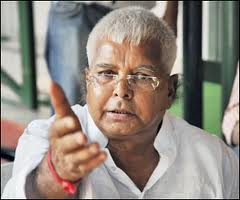
Lalu Prasad and Jagdish Sharma were Tuesday disqualified from the Lok Sabha following their conviction in the fodder scam, a Lok Sabha Secretariat official said.
Rashtriya Janata Dal (RJD) chief Lalu Prasad, an MP from Bihar's Saran district, and Janata Dal (United) MP Jagdish Sharma from Jahanabad in Bihar are the first Lok Sabha members to be disqualified after the Supreme Court order.
The July 10 verdict of the apex court mandated immediate disqualification from parliament and state legislatures of lawmakers convicted for criminal offences punishable with a jail term of more than two years.
Congress leader Rasheed Masood was Monday disqualified from the Rajya Sabha, following his conviction in a corruption case.
On Sep 30, a Special Central Bureau of Investigation (CBI) Court convicted Lalu Prasad, Jagdish Sharma and others in a case of fraudulent withdrawal of Rs.37.70 crore from Chaibasa treasury in the then undivided Bihar during 1994-95 when Lalu Prasad was the chief minister.
Special CBI Judge Pravas Kumar Singh sentenced Lalu Prasad to five years' imprisonment and slapped a Rs.25 lakh fine to him.
The RJD chief is lodged in Birsa Munda Central Jail in Ranchi, the Jharkhand capital where the special CBI court tried and convicted him.





Comments
Add new comment